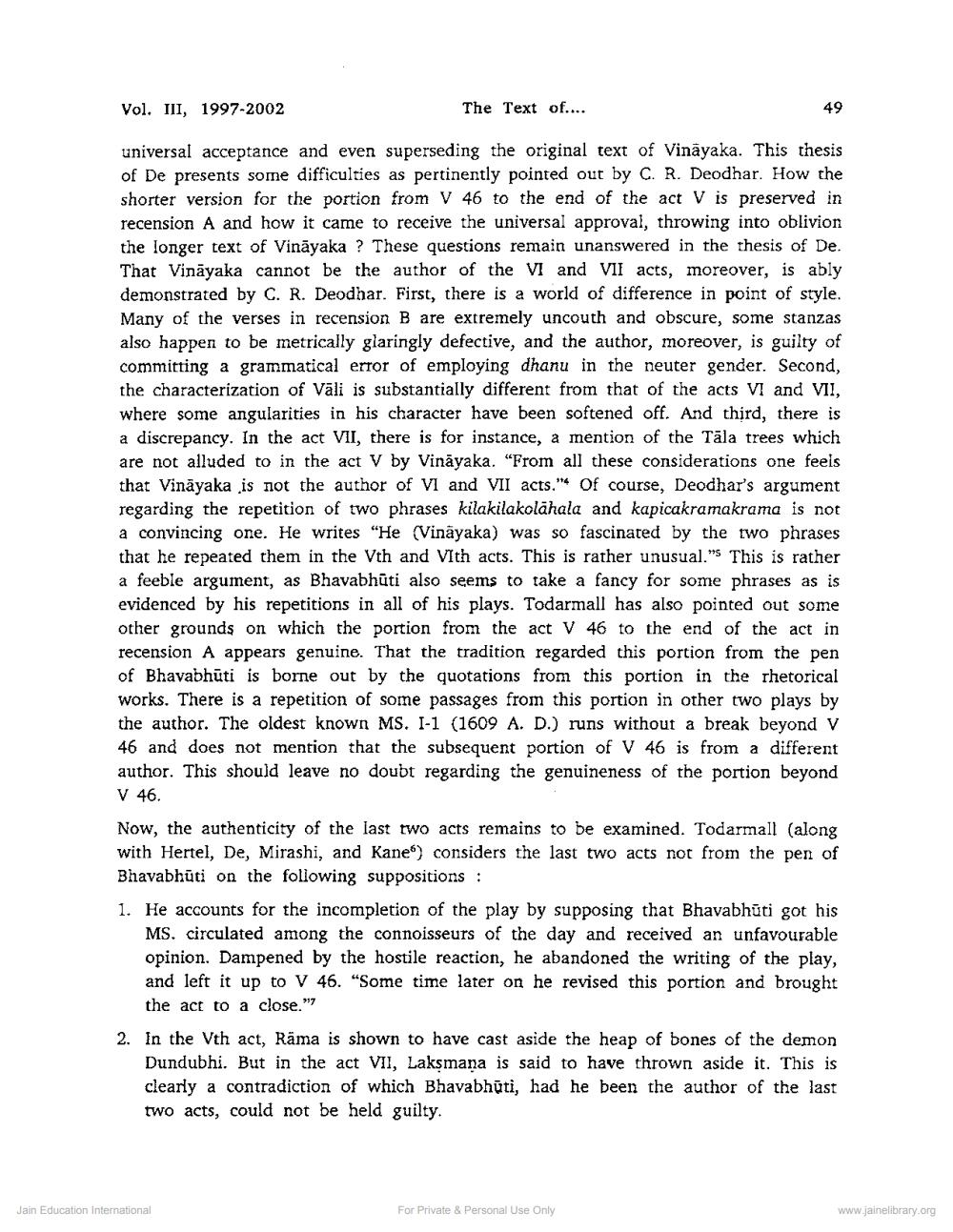Book Title: Text of Mahavircarita of Bhavbhuti Author(s): Vijay Pandya Publisher: Z_Nirgrantha_1_022701.pdf and Nirgrantha_2_022702.pdf and Nirgrantha_3_022703.pdf View full book textPage 2
________________ Vol. III, 1997-2002 The Text of.... 49 universal acceptance and even superseding the original text of Vinayaka. This thesis of De presents some difficulties as pertinently pointed out by C. R. Deodhar. How the shorter version for the portion from V 46 to the end of the act V is preserved in recension A and how it came to receive the universal approval, throwing into oblivion the longer text of Vināyaka ? These questions remain unanswered in the thesis of De. That Vināyaka cannot be the author of the VI and VII acts, moreover, is ably demonstrated by C. R. Deodhar. First, there is a world of difference in point of style. Many of the verses in recension B are extremely uncouth and obscure, some stanzas also happen to be metrically glaringly defective, and the author, moreover, is guilty of committing a grammatical error of employing dhanu in the neuter gender. Second, the characterization of Vāli is substantially different from that of the acts VI and VII, where some angularities in his character have been softened off. And thịrd, there is a discrepancy. In the act VII, there is for instance, a mention of the Tāla trees which are not alluded to in the act V by Vināyaka. "From all these considerations one feels that Vinayaka is not the author of VI and VII acts." Of course, Deodhar's argument regarding the repetition of two phrases kilakilakolāhala and kapicakramakrama is not a convincing one. He writes "He (Vinayaka) was so fascinated by the two phrases that he repeated them in the Vth and Vith acts. This is rather unusual." This is rather a feeble argument, as Bhavabhūti also seems to take a fancy for some phrases as is evidenced by his repetitions in all of his plays. Todarmall has also pointed out some other grounds on which the portion from the act V 46 to the end of the act in recension A appears genuine. That the tradition regarded this portion from the pen of Bhavabhūti is borne out by the quotations from this portion in the rhetorical works. There is a repetition of some passages from this portion in other two plays by the author. The oldest known MS. I-1 (1609 A. D.) runs without a break beyond V 46 and does not mention that the subsequent portion of V 46 is from a different author. This should leave no doubt regarding the genuineness of the portion beyond V 46. Now, the authenticity of the last two acts remains to be examined. Todarmall (along with Hertel, De, Mirashi, and Kanes) considers the last two acts nor from the pen of Bhavabhūti on the following suppositions : 1. He accounts for the incompletion of the play by supposing that Bhavabhūti got his MS. circulated among the connoisseurs of the day and received an unfavourable opinion. Dampened by the hostile reaction, he abandoned the writing of the play, and left it up to V 46. “Some time later on he revised this portion and brought the act to a close." 2. In the Vth act, Räma is shown to have cast aside the heap of bones of the demon Dundubhi. But in the act VII, Laksmana is said to have thrown aside it. This is clearly a contradiction of which Bhavabhūti, had he been the author of the last two acts, could not be held guilty. Jain Education International For Private & Personal Use Only www.jainelibrary.orgPage Navigation
1 2 3 4 5 6 7 8 9
